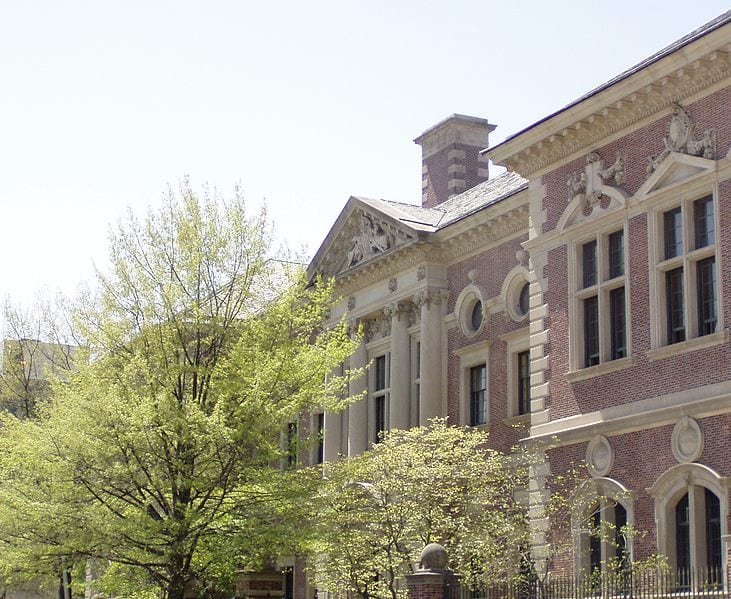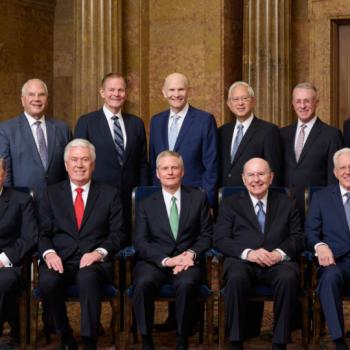
(Wikimedia Commons public domain media image)
First, though, here’s something new that was posted today on the website of the Interpreter Foundation:
***
Some readers here may recall that, in fits and starts, I’ve been working very occasionally on a massive project — planned to result, if it ever results in anything at all, in four or five sizable volumes — for which my working title has long been The Reasonable Leap into Light: An Argument for Skeptics. It is designed to argue, in a painstaking cumulative case, that it is rational to accept the claims of, first, theism; then, second, of Christian theism; and, finally, of Restored Christian theism. To that end, I share here some passages that I’ve extracted from the opening pages of David Skeel, True Paradox: How Christianity Makes Sense of Our Complex World (IVP Books, 2014).
David Skeel is S. Samuel Arsht Professor of Corporate Law at the University of Pennsylvania Law School. He does a pretty good job, I think, of framing a few of the basic issues that I will consider, should they ever actually see the light of day, in the first three or four volumes of Reasonable Leap into Light:
Why do we have consciousness — and odder yet, why do we have a compulsion to devise elaborate ideas about our place in the universe? Why do we experience beauty as transcendent yet somehow impermanent and corrupted, and suffering as somehow wrong, rather than simply a part of the natural order? Why do the advocates of each new system of justice believe they can devise legal codes that will achieve a fully just social order, even though every previous system of justice has failed? These are the kinds of questions that any religion or system of thought that claims to be true needs to have good answers to. (10)
For my purposes, a Christian is a man or woman (or girl or boy) who genuinely believes that Jesus Christ is God, that he was resurrected from the dead and that he is our means of reconciliation with God. The heart of Christianity lies in these (simple) beliefs, which can be summarized as belief in Jesus’ resurrection . . .
Some might complain that this definition leaves out too much. A true Christian, they might argue, also believes that Adam and Eve were actual people, not simply characters in a story; that the Exodus took place as described in the Bible; and that the four Gospels are an accurate historical account of Jesus’s life and ministry. I would not for a moment suggest that these or a number of other issues are unimportant. But they do not lie at the very heart of Christianity. The feature that makes Christianity different from any other religion or system of thought is Christians’ belief that Jesus, the God who became man, suffered, died and was raised from the dead to reconcile humans with God. (12)
[T]he distinguishing feature of Christianity has always been Christians’ belief that Jesus was raised from the dead. (13)
The second frequently mentioned perspective is materialism. By materialism, I mean the belief that the physical, material world is the ultimate reality — there is no supernatural God, gods or spirit(s). This view, or views somewhat like it, is sometimes referred to as naturalism or by still other names. I realize that when some readers hear the term materialism, their first thought has more to do [with] Black Friday, outlet stores or the bumper sticker “He who dies with the most toys wins” than with a denial of the supernatural. Some people who are preoccupied with possessions also are materialists in the sense I have in mind here, but others are not; indeed, some of the best-known materialists, such as the Princeton ethicist Peter Singer, rail against the acquisitive tendencies of contemporary Westerners (including Christians who share this tendency). Despite the ambiguity of materialism, those who reject the existence of God or supernatural forces are usually described as materialists, and each of the alternative labels has flaws of its own. I will stick with the conventional terminology. (13-14).
Consciousness, which the American Heritage Dictionary defines as the “critical awareness of one’s own identity and situation,” is the single most complex and mysterious feature of our existence. Consciousness is the subjectivity of our experience — what it feels like to be human. . . . Even if we could trace every connection among the estimated one hundred billion neurons in our brains, our sense of self would transcend the picture provided by the physical map. It is somehow more than the sum of our parts. If there is a “ghost in the machine,” as philosophers used to imagine, consciousness is that awe-inspiring ghost.
“The existence of consciousness is both one of the most familiar and one of the most astounding things about the world,” the philosopher Thomas Nagel (a religious skeptic) has written. “No conception of the natural order that does not reveal it as something to be expected can aspire even to the outline of completeness.” (37)
What purpose does our idea-making serve? After all, it is not immediately clear why it is necessary to our survival as individuals or as a species.
It is possible, of course, that our idea-making capacity is simply a game and that our theories about how to live may stretch our minds yet have no greater significance. It also is possible that our preoccupation with abstract theories about reality is an accidental byproduct of other, more meaningful, human traits. But it is highly unlikely that a capacity that is so central to our experience is, in a sense, a mistake — that it has no purpose. If a religion or system of thought is true, it should give us insight into what that purpose is. (38)
***
Finally, here’s some mainstream science news:
I’m not really sure whether this last one is “mainstream science news” or not:
“Army officer’s secret journal could offer new clues about the UFO crash in Roswell in 1947”











